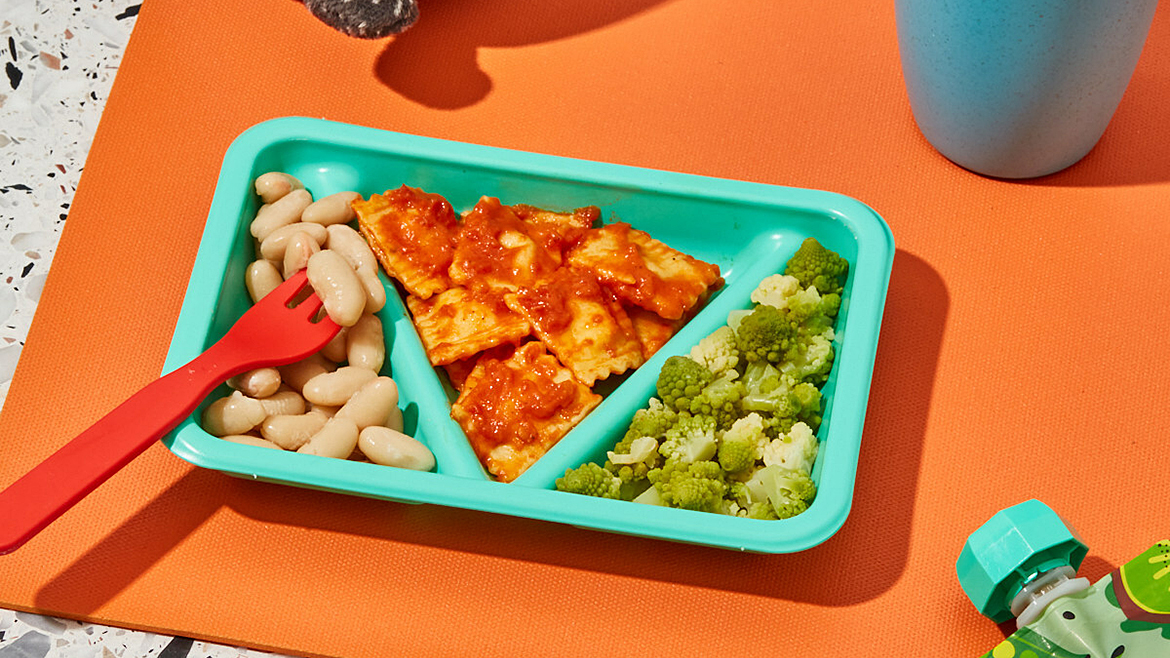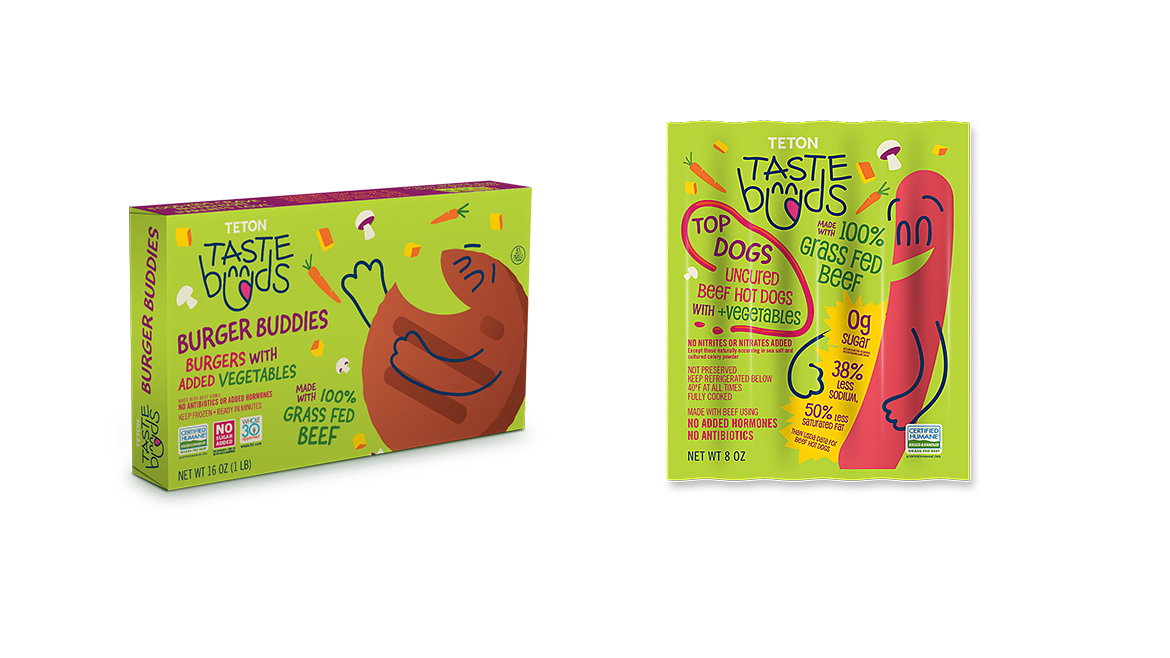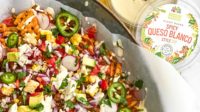Food for the youngest eaters is coming out of the jar. Fresh and frozen offerings, many featuring upgraded nutrition and convenience, are driving innovation while feeding the next generation.
Companies like Tiny Organics and Little Spoon are capitalizing on baby-led weaning, which encourages young children to feed themselves at their speed.
Founded in 2017, Little Spoon is a direct-to-consumer (DTC) portfolio of early childhood foods from baby’s first bite to age 7. In February, they launched Biteables, designed for the gap between baby food and table food. All meal components are cut-to-size and optimized for fine motor and oral skill development. Meals have at least 7 grams of protein, include vegetables and superfoods, and are under 250 milligrams of sodium. They are typically ready to eat in under 90 seconds.
“Biteables came out of a need vocalized by customers and we spent over a year developing and testing it. We have a small group of highly engaged customers who try our product. We put it in front of children and have them try it – we look at what the kids are eating and what they’re not eating,” said Angela Vranich,Little Spoon co-founder and chief product officer. “Baby-led weening is not going anywhere. It’s definitely a trending food philosophy and we’ve seen that with the success of the Biteables line: it took off like a rocket ship and is a testament to that feeding philosophy in general.”
The company focuses on palette expansion, offering 40 rotating items with seasonal flavors that focuses on different stages of eating. Products come refrigerated but many can be frozen at home.
Little Spoon has delivered over 27 million meals to parents across the U.S. and has over 2 million subscribers to their weekly newsletter, “Is This Normal,” which provides guidance on navigating eating stages, nutrition and other hot parenting topics.
“We have this one to one with our customers and have parents who we’re always talking to. We are constantly gathering insights,” Vranich said.
 Biteables are designed for the gap between baby food and table food with meal components optimized for fine motor and oral skill development. Image courtesy Little Spoon.
Biteables are designed for the gap between baby food and table food with meal components optimized for fine motor and oral skill development. Image courtesy Little Spoon.
Once Upon a Farm’s Advanced Nutrition Blends for Babies were the first products to be First 1,000 Day Promise Certified by the Clean Label Project. Inspired by European regulations, the First 1,000 Day Promise is the first U.S. certification that requires heightened nutritional elements and regulation of heavy metals, toxic compounds and melamine found in baby food.
Their cold-pressed (pouches) or freshly frozen (meals) are non-GMO, non-dairy recipes with no added sugar. They are free from artificial flavors, colors and preservatives.
The company rolled out “fresh baby coolers” earlier this year at Wegmans Food Markets across New York, Pennsylvania, New Jersey, Virginia, Maryland, Massachusetts, North Carolina and Delaware to complement an existing assortment of organic offerings.
"Fresh baby food is a fast-growing category, that's fueled by direct-to-consumer brands online. Once Upon a Farm was the first to bring fresh baby food to retail in 2016, and this expansion at Wegmans solidifies our partnership and their commitment as industry leaders to be the destination for the entire family," John Foraker, co-founder and CEO, said at the time of the rollout.
Once Upon a Farm said it plans to introduce baby coolers in thousands of stores nationally by 2024.
Inspired by combating childhood obesity and supporting healthy eating habits at all ages, Colorado-based Teton Waters Ranch will launch Teton Taste Buds in July, after nearly a year of product development.
 Teton Waters Ranch will launch Teton Taste Buds in July, a frozen and refrigerated line based off of 100% grass-fed beef with veggies like mushrooms, carrots and butternut squash. Image courtesy Teton Waters Ranch.
Teton Waters Ranch will launch Teton Taste Buds in July, a frozen and refrigerated line based off of 100% grass-fed beef with veggies like mushrooms, carrots and butternut squash. Image courtesy Teton Waters Ranch.
“The solution people come up with is to feed kids things that they don’t want to eat. A child says ‘I don’t like it’ and the conversation is over,” said Jeff Tripician, CEO of Grass Fed Foods, owner of Teton Waters Ranch.
The line features three frozen and one refrigerated product, based off of 100% grass-fed beef with veggies like mushrooms, carrots and butternut squash, mixed in. The company partnered with a Colorado school district to help develop the products with a focus on micronutrients and making sure the taste, look and mouthfeel felt like traditional beef products.
“If you can arm families with a reasonably priced solution and the kids will eat it, that’s how human health gets better. For example, the sodium levels in our Tastebuds hotdogs drop 50% when compared to a traditional hotdog,” said Tripician, a grandfather himself. “We have a very creative packaging design - we’ve animated a hotdog and a hamburger and put colors on it that just don’t belong but they are fun. That’s the point – it should be a fun eating experience for the child and endorsed by the parent.”
The global baby food market is expected to grow to $58.2 billion by 2026, at a compound annual growth rate (CAGR) of 6.1%, according to Research and Markets. The next generation’s food habits are being shaped now and companies are experimenting with new ingredients like dragon fruit, turmeric and rosemary, and continuing to look for creative ways to package their foods. For example, some Little Spoon products come in custom tray designed to fit perfectly on a highchair.
“We plan to age up with our customer,” Vranich said. “Parents today are seeking something better than what their parents fed them. We only see the baby and kid foods space becoming fresher overtime.”




